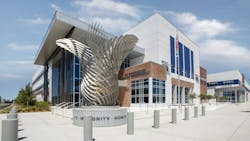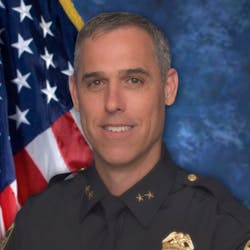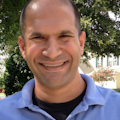When designing its new headquarters and training center, which opened in 2019, the St. Petersburg Police Department in Florida made sure it could adapt to future needs while serving as a flexible tool to its officers. Assistant Police Chief Michael Kovacsev, who was a member of the judging panel for the 2023 OFFICER Station Design Awards, spoke with OFFICER Magazine about planning for the future and the challenges that lie ahead.
This interview has been edited for clarity and length.
How long did it take to build the HQ building?
The headquarters project was a dream for the better half of two decades. The original buildings were from the 1930s and the 1960s and 70s across the street. They didn’t fit the needs of the agency, especially how much we’ve grown. We lobbied our politicians and received funding. It took a few years to get everything brought together and then in 2015/2016, we started doing a spatial needs assessment on what the department had and what it would need. Between the design and the build, it took a little over three years.
Is there anything you would have changed?
A number of the items that we tried to put in the building had to do with growth within the areas themselves. If you had 12 detectives in the Major Crimes area, you’d want to potentially have the growth for up to 16 or 18 in the future. That was one of the more challenging parts of the building because so many of the areas have the growth built within their areas, rather than putting an annex spot that’s vacant for future use, a lot of the extra or the future growth was built specifically in those areas. We have walls that could be removed to allow for areas to become smaller or larger depending on footprints. In some of the training areas, we have walls that were designed to bifurcate the rooms or make them larger, to be used for other purposes.
How has the flexibility come into play?
A couple of the areas over the last few years have grown in size and a few others have retracted. We did not anticipate the growth of our digital forensics area. Because they have increased with so many officers, but a few of the other areas—like report writing—have stayed stagnant or have gone down a little bit. We found the ability where we can just flip-flop. One unit would take over a larger area, and then a second unit could take over the smaller one.
What are the benefits of the training center?
We originally had a firing range a couple miles from the station that was built in the 1980s, and it was managed by a nonprofit organization. After almost 40 years, it needed to be upgraded and significant costs needed to be placed into it that they just didn’t have. We took the old firing range and repurposed it into four classrooms and then added in a 10-lane indoor firing range that not only allowed for handguns, but also for rifle qualifications. This allowed smaller agencies in our county to use the range on off days.
Have the facilities served as a recruiting tool?
When someone comes here and takes a look at our building, it’s definitely an eye-catcher. They have everything that they need as new officers to be successful in the field, and it gives them a place where they can be proud to show their family, to walk around and see it as a benefit.
What are the biggest challenges for 2024?
I think the biggest issue will continue to be recruitment. It’s the willingness of people wanting to come into a profession that took some lumps over the last few years. It was not the most revered. Some of it was navigating changes that needed to be made. I think that our department especially, but most departments, have stepped up to that challenge.
Listen to the full interview at officer.com/53079667
About the Author
Paul Peluso
Editor
Paul Peluso is the Managing Editor of OFFICER Magazine and has been with the Officer Media Group since 2006. He began as an Associate Editor, writing and editing content for Officer.com. Previously, Paul worked as a reporter for several newspapers in the suburbs of Baltimore, MD.



